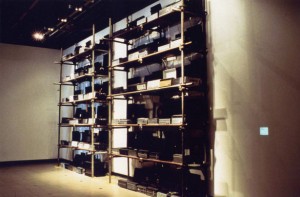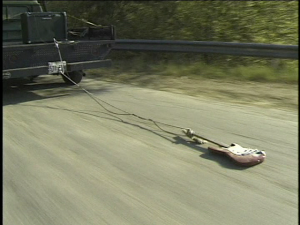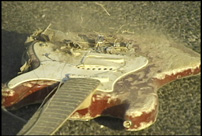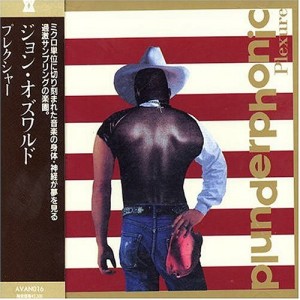
Discogs
I spend a lot of time in art galleries, and of course am a bit obsessed by experimental music, so the Hayward Gallery’s 2000 “sound art” exhibition, curated by the always interesting David Toop was a must for me. This post is the double CD compilation which came with the exhibition catalogue, and while it suffers a bit from the lack of accompanying visuals (and for you the lack of the catalogues extensive notes on all the artists), there’s enough here to maintain interest.
I’ll talk a bit about some of my favourites.
Firstly, Philip Jeck whose work revolves around having loads of old Dansette record players playing “distressed” records. For Sonic Boom, the record players were all stuck on a single groove, and were switched on and off with timers, which produced a suprisingly effective audio collage.

Christian Marclay’s piece, Guitar Drag, needs a bit of explanation. What he did was fix a guitar amp to the back of a flatbed truck, plug a guitar in and drag it behind the truck until the guitar was destroyed. At Sonic Boom, this was a film, but here it’s only an except of the film’s soundtrack. It’s surprisingly listenable, that is if you’re into experimental guitar music, and taps into the destruction of guitars by endless rock gods, but also the popular pastime of murdering black men in the American south (where this was filmed) by dragging them behind trucks not too many decades ago.


I’d like to post some Ryoji Ikeda here – I’ve been fond of his minimalist electronice for a long time, but everything I have is still available, so the extract here from his zero degrees album will have to do.
Lee Renaldo and Brian Eno need no introduction, I’ve talked about John Oswald before, and will post some Thomas Köner stuff at some point in the future.
This compilation is of course flawed, as was the exhibition it documents. It’s incomplete because it’s audio only, and some of the tracks weren’t at the exhibition at all because what was wouldn’t have worked here. Nevertheless there’s lots here which is worth a listen if you have a liking for the experimental, and a few rare gems from better known artists.
Here’s a tracklisting, lifted as usual from Discogs:
CD1.1 Scanner – The Collector
Composed By – Robin Rimbaud 4:00
CD1.2 Ken Ikeda & Mariko Mori – Miko No Inori
Composed By – Ken Ikeda 4:00
CD1.3 Pan Sonic – Alku 2:27
CD1.4 Project Dark – Step 1, Step 2, Step 3 2:40
CD1.5 Max Eastley & Thomas Köner – In Concert 6:14
CD1.6 Christina Kubisch – Oase 2000 7:36
CD1.7 Bow Gamelan* & Paul Burwell – Never Mind The Rowlocks
Composed By – P.D. Burwell* 4:00
CD1.8 Christian Marclay – Guitar Drag 4:00
CD1.09 Stephan Von Huene – Extended Schwitters 6:57
CD1.10 Angela Bulloch – Theremin 7:17
CD1.11 Chico Macmurtrie – Yoyo Berimbau 1:11
CD1.12 Greyworld – Studio 5 2:30
CD2.1 Ian Walton & Russell Mills – Mantle 7:01
CD2.2 Lee Ranaldo – El Oido (The Ear) 6:07
CD2.3 Philip Jeck – Off The Record 5:22
CD2.4 Brian Eno – Kites III (Extract) 7:19
CD2.5 Ryoji Ikeda – 0* :: Zero Degrees (1) 3:31
CD2.6 John Oswald – Mad Mod 2:12
CD2.7 Paul Schütze – The Head, The Soles Of The Feet, An Arm (Extract) 6:33
CD2.8 João Paulo Feliciano & Rafael Toral – Rlo I 6:58
CD2.9 Disinformation – National Grid 6:43
CD2.10 Max Eastley – Domain Of Presences
Mastered By – Peter Cusack 7:21
CD2.11 Heri Dono – Watching The Marginal People 2:00





